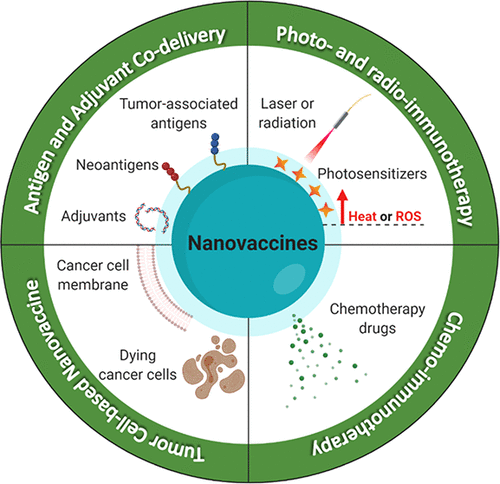当前位置:
X-MOL 学术
›
Acc. Chem. Res.
›
论文详情
Our official English website, www.x-mol.net, welcomes your
feedback! (Note: you will need to create a separate account there.)
Engineered Nanoparticles for Cancer Vaccination and Immunotherapy
Accounts of Chemical Research ( IF 16.4 ) Pub Date : 2020-10-05 , DOI: 10.1021/acs.accounts.0c00456 Marisa E Aikins 1, 2 , Cheng Xu 1, 2 , James J Moon 1, 2, 3
Accounts of Chemical Research ( IF 16.4 ) Pub Date : 2020-10-05 , DOI: 10.1021/acs.accounts.0c00456 Marisa E Aikins 1, 2 , Cheng Xu 1, 2 , James J Moon 1, 2, 3
Affiliation

|
The immune system has evolved over time to protect the host from foreign microorganisms. Activation of the immune system is predicated on a distinction between self and nonself. Unfortunately, cancer is characterized by genetic alterations in the host’s cells, leading to uncontrolled cellular proliferation and evasion of immune surveillance. Cancer immunotherapy aims to educate the host’s immune system to not only recognize but also attack and kill mutated cancer cells. While immune checkpoint blockers have been proven to be effective against multiple types of advanced cancer, the overall patient response rate still remains below 30%. Therefore, there is an urgent need to improve current cancer immunotherapies. In this Account, we present an overview of our recent progress on nanoparticle-based strategies for improving cancer vaccines and immunotherapies. We also present other complementary strategies to give a well-rounded snapshot of the field of combination cancer immunotherapy. The versatility and tunability of nanoparticles make them promising platforms for addressing individual challenges posed by various cancers. For example, nanoparticles can deliver cargo materials to specific cells, such as vaccines delivered to antigen-presenting cells for strong immune activation. Nanoparticles also allow for stimuli-responsive delivery of various therapeutics to cancer cells, thus forming the basis for combination cancer immunotherapy. Here, we focus on nanoparticle platforms engineered to deliver tumor antigens, whole tumor cells, and chemotherapeutic or phototherapeutic agents in a manner to effectively and safely trigger the host’s immune system against tumor cells. For each work, we discuss the nanoparticle platform developed, synthesis chemistry, and in vivo applications. Nanovaccines offer a unique platform for codelivery of personalized tumor neoantigens and adjuvants and elicitation of robust immune responses against aggressive tumors. Nanovaccines either delivering whole tumor cell lysate or formed from tumor cell lysate may increase the repertoire of tumor antigens as immune targets while exploiting immunogenic cell death to prime antitumor immune responses. We also discuss how antigen- and whole tumor cell-based approaches may open the door for personalized cancer vaccination and immunotherapy. On the other hand, chemotherapy, phototherapy, and radiotherapy are more standardized cancer therapies, and nanoparticle-based approaches may promote their ability to initiate T cell activation against tumor cells and improve antitumor efficacy with minimal toxicity. Finally, building on the recent progress in nanoparticle-based cancer immunotherapy, the field should set the ultimate goal to be clinical translation and clinical efficacy. We will discuss regulatory, analytical, and manufacturing hurdles that should be addressed to expedite the clinical translation of nanomedicine-based cancer immunotherapy.
中文翻译:

用于癌症疫苗和免疫治疗的工程纳米颗粒
免疫系统随着时间的推移而进化,以保护宿主免受外来微生物的侵害。免疫系统的激活取决于自我和非自我之间的区别。不幸的是,癌症的特点是宿主细胞的基因改变,导致不受控制的细胞增殖和逃避免疫监视。癌症免疫疗法旨在教育宿主的免疫系统不仅能够识别而且能够攻击和杀死突变的癌细胞。尽管免疫检查点阻断剂已被证明对多种类型的晚期癌症有效,但患者总体缓解率仍低于 30%。因此,迫切需要改进现有的癌症免疫疗法。在本报告中,我们概述了基于纳米粒子的改进癌症疫苗和免疫疗法的策略的最新进展。我们还提出了其他补充策略,以全面介绍联合癌症免疫治疗领域。纳米粒子的多功能性和可调性使其成为解决各种癌症带来的个体挑战的有前途的平台。例如,纳米粒子可以将货物材料递送至特定细胞,例如递送至抗原呈递细胞以进行强免疫激活的疫苗。纳米颗粒还允许将各种治疗药物刺激响应地递送至癌细胞,从而形成组合癌症免疫疗法的基础。在这里,我们专注于设计用于递送肿瘤抗原、整个肿瘤细胞以及化疗或光治疗剂的纳米颗粒平台,以有效、安全地触发宿主针对肿瘤细胞的免疫系统。 对于每项工作,我们讨论了开发的纳米颗粒平台、合成化学和体内应用。纳米疫苗提供了一个独特的平台,可同时递送个性化肿瘤新抗原和佐剂,并引发针对侵袭性肿瘤的强大免疫反应。递送整个肿瘤细胞裂解物或由肿瘤细胞裂解物形成的纳米疫苗可以增加作为免疫靶标的肿瘤抗原的库,同时利用免疫原性细胞死亡来引发抗肿瘤免疫反应。我们还讨论了基于抗原和整个肿瘤细胞的方法如何为个性化癌症疫苗接种和免疫治疗打开大门。另一方面,化疗、光疗和放疗是更标准化的癌症治疗方法,基于纳米颗粒的方法可能会提高它们启动针对肿瘤细胞的T细胞激活的能力,并以最小的毒性提高抗肿瘤疗效。最后,基于纳米颗粒癌症免疫疗法的最新进展,该领域应将最终目标设定为临床转化和临床疗效。我们将讨论应解决的监管、分析和制造障碍,以加快基于纳米医学的癌症免疫疗法的临床转化。
更新日期:2020-10-21
中文翻译:

用于癌症疫苗和免疫治疗的工程纳米颗粒
免疫系统随着时间的推移而进化,以保护宿主免受外来微生物的侵害。免疫系统的激活取决于自我和非自我之间的区别。不幸的是,癌症的特点是宿主细胞的基因改变,导致不受控制的细胞增殖和逃避免疫监视。癌症免疫疗法旨在教育宿主的免疫系统不仅能够识别而且能够攻击和杀死突变的癌细胞。尽管免疫检查点阻断剂已被证明对多种类型的晚期癌症有效,但患者总体缓解率仍低于 30%。因此,迫切需要改进现有的癌症免疫疗法。在本报告中,我们概述了基于纳米粒子的改进癌症疫苗和免疫疗法的策略的最新进展。我们还提出了其他补充策略,以全面介绍联合癌症免疫治疗领域。纳米粒子的多功能性和可调性使其成为解决各种癌症带来的个体挑战的有前途的平台。例如,纳米粒子可以将货物材料递送至特定细胞,例如递送至抗原呈递细胞以进行强免疫激活的疫苗。纳米颗粒还允许将各种治疗药物刺激响应地递送至癌细胞,从而形成组合癌症免疫疗法的基础。在这里,我们专注于设计用于递送肿瘤抗原、整个肿瘤细胞以及化疗或光治疗剂的纳米颗粒平台,以有效、安全地触发宿主针对肿瘤细胞的免疫系统。 对于每项工作,我们讨论了开发的纳米颗粒平台、合成化学和体内应用。纳米疫苗提供了一个独特的平台,可同时递送个性化肿瘤新抗原和佐剂,并引发针对侵袭性肿瘤的强大免疫反应。递送整个肿瘤细胞裂解物或由肿瘤细胞裂解物形成的纳米疫苗可以增加作为免疫靶标的肿瘤抗原的库,同时利用免疫原性细胞死亡来引发抗肿瘤免疫反应。我们还讨论了基于抗原和整个肿瘤细胞的方法如何为个性化癌症疫苗接种和免疫治疗打开大门。另一方面,化疗、光疗和放疗是更标准化的癌症治疗方法,基于纳米颗粒的方法可能会提高它们启动针对肿瘤细胞的T细胞激活的能力,并以最小的毒性提高抗肿瘤疗效。最后,基于纳米颗粒癌症免疫疗法的最新进展,该领域应将最终目标设定为临床转化和临床疗效。我们将讨论应解决的监管、分析和制造障碍,以加快基于纳米医学的癌症免疫疗法的临床转化。










































 京公网安备 11010802027423号
京公网安备 11010802027423号